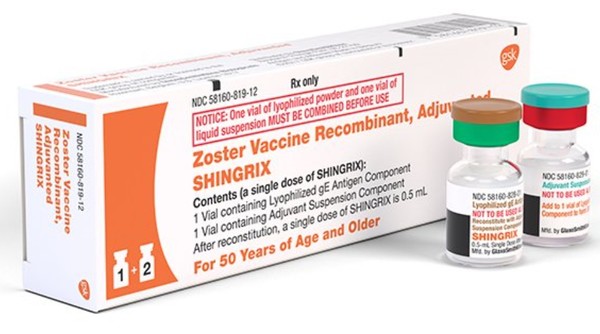GSK Korea said that the Ministry of Food and Drug Safety has approved Shingrix, its shingles vaccine.

With the approval, hospitals can use Shingrix to prevent herpes zoster, also known as shingles, in adults over 50 or people over 18 who are at high or expected to have an increased risk of shingles due to reduced immunity or immunosuppression.
The ministry based its approval on the results of two phase 3 clinical trials ZOE-50 and ZOE-70, in which more than 38,000 people participated. In addition, the company evaluated the efficacy and safety of Shingrix compared to placebo in 15,411 adults 50 years of age and older.
During an average follow-up period of 3.2 years, six patients in the Shingrix group and 210 patients in the placebo group tested positive for shingles, showing a 97.2 percent preventive effect in the Shingrix group. In addition, in an integrated analysis of participants over 70 in the ZOE-50 clinical study and the ZOE-70 clinical study, the company confirmed a preventive effect of 91.3 percent in the Shingrix group.
"GSK is conducting a long-term follow-up study for participants in both clinical studies to confirm the long-term effectiveness, safety, and immunogenicity of Shingrix," the company said. "As a result of follow-up for seven years, the company has confirmed that Shingrix continuously maintained over 90 percent of the preventive effect in all age groups regardless of the frailty index."
Jean Park, head of GSK Korea's vaccines business unit, also said, "The risk and severity of herpes zoster increase with age as the immune system's ability to respond strongly and effectively to the infection decreases. Therefore, GSK developed Shingrix to overcome the decline in immunity caused by aging and prevent herpes zoster."
The company is very happy with the approval of Shingrix and expects that it will help reduce the patient's burden of suffering from shingles, Park added.
Shingles occur when the varicella-zoster virus (VZV), which causes chickenpox, remains dormant in childhood and then reactivates. An age-related decline in immunity mainly causes herpes zoster. With age, the number and function of immune cells that inhibit VZV reactivation decrease, increasing the incidence and severity of herpes zoster.
Shingrix is the first recombinant inactivated vaccine that combines glycoprotein E, a protein component of VZV, and AS01B. This immune enhancer enhances the immune response to antigen and induces a strong and sustained immune response.
A patient receives 0.5 mL of the vaccine intramuscularly twice at an interval of two months. As Shingrix is an inactivated vaccine, hospitals can also administer the vaccine to immune-compromised patients.

